Gemini, Soseiji (Twins) (1999)
Directed by: Shinya Tsukamoto
Written by: Rampo Edogawa, Shinya Tsukamoto
Starring: Masahiro Motoki, Ryô, Yasutaka Tsutsui
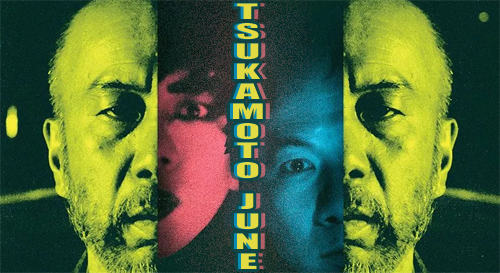
Now available from Third Window on Blu-ray and to Stream
Rats, maggots, disease, unsettling sounds courtesy of Chu Ishikawa… it must be another Shinya Tsukamoto movie. A period drama might not be the kind of project anyone would be expecting from the director who, at the time, was mainly known for stop motion effects and industrial locations. But this blend of Meiji Era fashion and existential dread isn’t exactly typical fare. The eyebrows and the hairdos are certainly a fascinating choice. In some ways there are familiar ingredients involved as this is a tale of good and evil twins; and a story about a wealthy and a poor man who look alike. This is also based on a short story from the same time period rather than being a bizarre original script. But while archetypal characters and familiar narrative beats are used there are many strange moments waiting to creep out of the shadows.
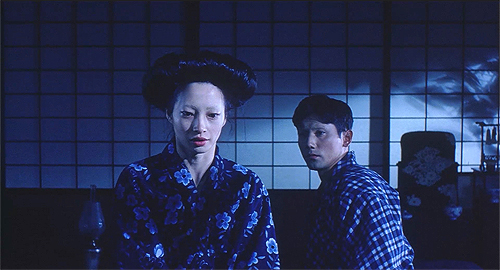
Yukio Daitokuji (Masahiro Motoki) is a renowned doctor living a comfortable life. Thanks to some kind of wartime heroism he gets to choose his patients and local officials seek out his advice. He was also able to choose his wife Rin (Ryô) though she claims to be an amnesiac. This presents a paradox and a problem in the family home. Who is she really and what is her lineage? Yukio’s parents are obsessed with cleanliness and status, which doesn’t bode well for the marriage. Despite his father’s words on medical ethics they clearly don’t care for Rin, who survived a fire and was left with nothing until Yukio took her in. However, some of the details are being kept from his parents which says a lot about the extent of their real feelings. Saving lives is more important when it gets military medals and fame.
The family live in a fairly nice looking place and employ plenty of staff. In a nearby slum people aren’t so lucky, something which Yukio clearly has disdain for. His own feelings come out while treating a boy from a middle-class family who was injured by slum children. A kind of underlying disgust bubbles to the surface when he talks about the area which is filled with disease. Some of which in his opinion is moral rather than just medical. This idea of double-standards starts to manifest itself later when he is given the choice of helping the mayor or helping a woman and child who have a plague. Unsurprisingly the choice is not a difficult one for Yukio. It’s something that will have repercussions later when his darker side starts to take a physical form and all the mirror madness begins.
There are two distinct dimensions to his character and the film itself. Life at the Daitokuji home is cold and clinical, with a lot of slow movement and blue lighting. Only the occasional sugar cube with tea or a servant laughing brings a smile to the faces of the family. Yukio’s relationship feels sterile and he’s shown sleeping with a notable distance from his wife. If he has a soul it’s buried pretty well considering his main motives are supposed to be romance and charity. It’s telling that when things start to go awry the first sign is a bad smell in the house, before his parents are found dead. Both die under strange circumstances related to dirt which seems pretty symbolic. Soon the story starts to feel like it’s becoming infected by the slum; and by Tsukamoto’s personal touch.
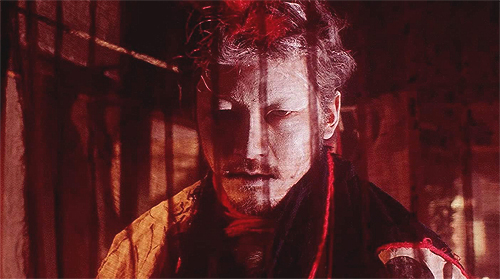
In terms of his signature camera work any kind of frenetic movements are used sparingly, as are visual flourishes like plague masks and apparition-like samurai. As a result these sort of unusual moments have a certain impact. The arrival of a strange filth encrusted man is no exception; signally that Yukio’s tidy life is about to fall apart. The sterility of the clinic is contrasted with this creeping acrobat whose colourful rags and matted hair are totally alien. The slum itself is also an energetic, if repulsive, location. Heat and smoke rises from huts that are filled with thieves working as part of a theatre troupe. It’s a place where people are killed for trivial items and where fires rage. The things going on feel more alive in this location, for better or worse. Soon orange light starts to bleed into Yukio’s home while he becomes trapped in a hole in which the only colours are brown and green.
This kind of distinct division is more ambiguous when it comes to who is good and who is bad. Yukio’s doppelgänger Sutekichi is a strangely cruel figure rather than someone who is out for justice. Characters constantly lie to one another causing pain whether it’s intentional or not. The idea of inherent evil is never clear cut and even a hopefully ending is tainted by the strange possibility of a continuing façade. Often simple ideas such as escaping despair through decisive action or acts of love are in doubt. Putting on a face seems to be in the nature of everyone concerned whether they are actors from the theatre or not. Masahiro Motoki‘s dual performance is occasionally predicable; sometimes scenery chewing and sometimes distracted and cold. But there is also a subtle side which is harder to read, again adding more nuance to what could be a simplistic tale.
In some ways the sombre nature of the story and the staginess of the film are a problem. It’s certainly quite slow for a feature which is under ninety-minutes, so viewers expecting another rush of high-octane nightmare fuel may be disappointed. But random acts of violence and bursts of colour during flashbacks mean this isn’t a dour experience. A little goes along way in terms of both hyperactive visuals and the score. Sudden uses of sampled voices or the rush of electronic instruments arrive just at the right moments. The initial intruder mystery and the amnesia plot seem like the main hooks at first but there are more intriguing moments as the story unfolds. It’s still a story about secret shame and obsession at its core. The overall style might not be as confident as the director’s earlier features but it’s an engrossing step towards more projects outside of body horror.
Rating: 









Further Reading:
Previously on Tsukamoto June:


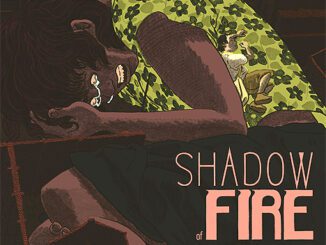
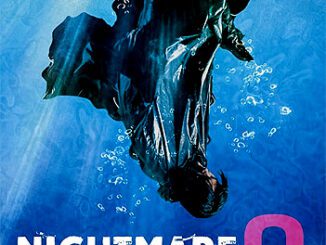

Be the first to comment